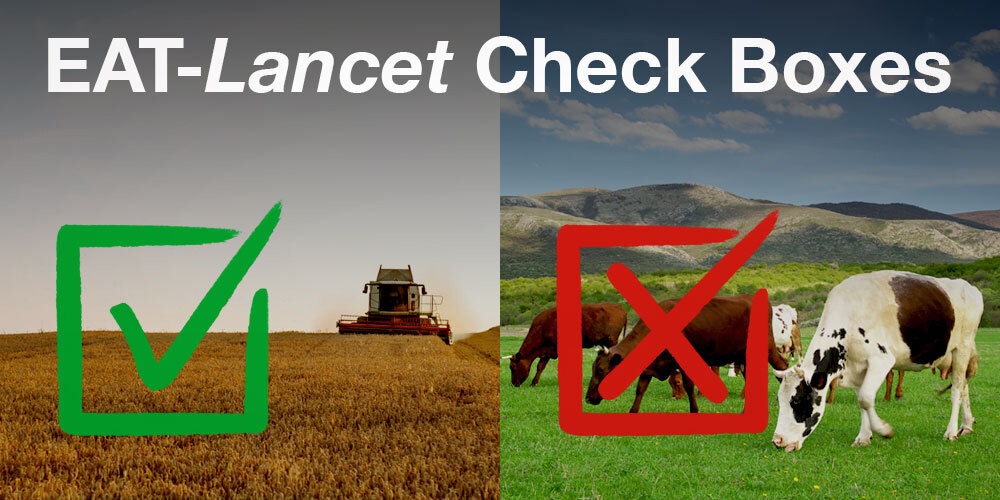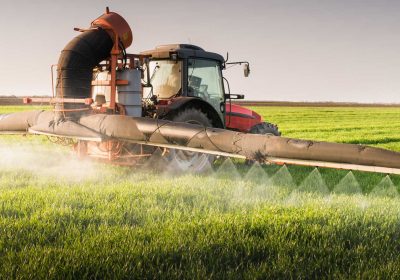Six years after the last EAT-Lancet Commission told us that we needed to halve meat consumption and eat more whole grains, they’ve produced a new report. Find out why it doesn’t stack up and why we shouldn’t comply.
By Rob Verkerk PhD, founder, executive & scientific director. Edited for ANH-USA by Michael Ames-Sikora. Read the original at ANH International
THE TOPLINE
- Dietary recommendations for EAT-Lancet 2025 barely shift from 2019—mostly re-labels and rounding. It still pushes a one-size-fits-all “planetary” diet that sidelines regenerative agriculture, bio-individuality, cultural diversity, and metabolic needs
- The report leans on modelling and associative epidemiology while downplaying real-world evidence, nutrient density, and risks of nutritional inadequacies (e.g., sodium and animal-sourced foods)
- The new PHD index is a policy tool that can be tied to procurement, guidelines, ESG scoring—and potentially even taxes or penalties—moving diet from personal choice to compliance metrics
- Regenerative, seasonal, regional and culturally rooted diets—measured by real health outcomes (metabolic markers, nutrient sufficiency, resilience) rather than top-down indices—offer a more effective, ethical route to human and planetary health.
For those of us who believe that food is medicine, choosing what to eat is one of the most important health decisions we make every day. But when it comes to “expert” diet advice, there’s a lot of bad information out there—especially when that advice conveniently serves corporate or political interests. The latest example comes from the EAT-Lancet Commission, whose new report, EAT-Lancet 2.0, once again claims to have found the “universal” formula for saving both people and the planet. But beneath the lofty language lies the same old problems: centralized control, corporate influence, and a one-size-fits-all diet that ignores biology, culture, and common sense.
Some of you may remember that when the EAT-Lancet Commission came out with its Planetary Health Diet back in 2019 (‘Food in the Anthropocene: the EAT–Lancet Commission on healthy diets from sustainable food systems’), we lambasted its efforts.
As soon as the 2019 report was published, I worked feverishly to understand where EAT-Lancet was going, given my background spanning both health and agricultural sustainability. The end product was what I still believe may have been not only the first, but also the most comprehensive rebuttal of EAT-Lancet’s one-size fits all approach. I argued the EAT-Lancet Commission’s approach failed on nearly every count: nutritionally, scientifically, socially, and environmentally.
The only tick in the box I’d have been happy to check for EAT-Lancet 1.0 was that it was a prime example of desk-based science unrelated to the real world that serves to propagate a specific narrative: in this case, that ruminant farm animals are the ultimate scourge, and that the mainstream climate change narrative is unassailable and the most important issue of our time. Incidentally, this is the same line of thinking that is behind the push to get us all eating lab-grown meat and synbio foods.
Clearly in recognition of at least a few of the EAT-Lancet 1.0 shortfalls, the EAT-Lancet Commission has seen fit to issue version 2.0.
What’s new in EAT-Lancet 2.0?
We were particularly scathing about the original report’s lack of dietary flexibility, and with a modicum of applause, we welcome EAT-Lancet 2.0’s shift from a single “universal diet” to a more explicitly flexible planetary health diet (PHD) within ranges. They’ve also upgraded their modelling approach to create a PHD adherence index. Yes, a mechanism to assess compliance, initially at national and regional levels. But who is to say this couldn’t be the precursor to the tracking of individuals and even a mechanism to impose additional taxes or restrictions on individuals based on their degree of compliance or non-compliance?
The Commission claims version 2.0 delivers larger health gains and an improved global carbon footprint, while offering more nuance on animal-source foods (system-specific risks, circularity). With an audible sigh of relief, we can inform you that the authors have at least accepted that ultra-processed foods (UPFs) are problematic and they rightly advocate for minimally processed foods. The trouble is that their obsession with whole grains as staples continues with no apparent recognition of the trouble this causes with overuse of herbicides like glyphosate, simplification of agro-ecosystems through monoculture and soil erosion, not to mention the continued exposure of billions of humans who are sensitive to, or intolerant of, gluten-containing grains that play havoc with their guts, microbiomes and immune systems.
Our 2019 concerns included:
- one-size-doesn’t-fit-all (e.g., lack of cultural sensitivity, there were no options for regional ‘tailoring’)
- continued demonization of livestock farming without adequate scientific basis
- over-reliance on evidence from industrialized farming systems
- risks of nutritional inadequacies
- policy overreach
- impacts on agricultural livelihoods (especially smallholders), and
- failure to recognize environmental benefits of regenerative or agro-ecological farming
Unfortunately, version 2.0 has done little to change any of these big issues. Yes, there are some adjustments that are in the right direction, but in many key areas there is no substantive change.
The 2025 update retains the same underlying vision as its predecessor: a radical transformation of global food systems to feed an anticipated 9.6 billion people by mid-century, while promoting human and planetary health.
The “Planetary Health Diet” (PHD)—grain-heavy, plant-dominant, low in animal-source foods—remains the centerpiece of version 2.0. Its underlying message remains the same: halve global meat consumption, double plant-based food intake, and halve food loss and waste.
We’re all in on this last point, but regarding the first two, we’d be a lot happier if they’d agreed to halve industrially farmed meat consumption and increase consumption of non-grain based plant foods. It’s just not part of the globalist plan.
Conflicts of interest: Flora Power

In 2019 we highlighted transparency issues around funding and institutional affiliations, particularly between The Lancet, the EAT Forum, and the Wellcome Trust. In 2025, Flora Food Group (yes, of margarine fame) has become one of the main partners to the EAT Forum, casting further doubts over the direction of the project.
Flora is the Dutch company that was spun out of Unilever’s ultra-processed vegetable spread division which was acquired by the private equity firm KKR in 2018. The company owns brands like Flora, Becel + ProActiv, Blue Band, Country Crock, Rama and Violife. These questions—unaddressed in 2019—remain unresolved in 2025, casting continued doubt on the objectivity of the science (Real ScienceTM) presented.
Ungrounded justice
The proposal that national governments correct inequities in food-related human rights, when half the world’s population lacks the means to meet basic nutritional needs, is politically, economically, and culturally unrealistic. Try telling a Maasai herdsman he’s got to get rid of his cattle to save both the planet and his community’s health.

The call for a 33% global reduction in livestock to cut methane emissions, paired with a 63% rise in fruit, vegetable, and nut production, overlooks crucial regional realities. Regenerative grass-based livestock systems, whether on the pastures of Wales, Ireland, Scotland or New Zealand, or the grasslands of sub-Saharan Africa, are among the most sustainable in the world—yet they are dismissed in favor of uniform dietary prescriptions. This risks destabilizing local economies, centralizing power in the hands of Big Ag and Big Gov, and eroding food sovereignty.
Net-zero dogma
The proposed “net-zero food system” through sustainable intensification and carbon sequestration relies on unprecedented levels of investment and global coordination—conditions that would decimate almost every traditional smallholder regenerative farming system.
While the newly modeled scenarios suggest a 20% emissions reduction through combined actions (dietary shifts, waste reduction, productivity gains), these outcomes assume ideal compliance and perfect governance. Tell us how this will happen without very tight surveillance. Aaah….enter the new-fangled PHD index that could be just the tool to drive global compliance.
Aspirations Without Economics
The path to planetary and human health lies not in a one-size-fits-all diet, but in diverse, locally adapted, transparent, and participatory and regenerative systems of food and health—systems that empower people rather than prescribe to them.
Until EAT-Lancet engages with that reality, its “win-win” seems more like a propaganda effort designed to welcome in the kind of globalization template dreamed up by the UN with its Sustainable Development Goals.
They’re not what they seem (see here, here and here).
In the interests of human and planetary health, sovereignty and decentralized power, please circulate this article widely.





Sorry to say, I don’t hold out much hope of Congress actually doing the right thing here. If it means going against Big Pharma, they won’t do it. Not only are they bribed, (in the pocket of Big Pharma) but I believe that many are also being blackmailed with evidence that could put them in jail for a very long time.
I would like it if you would start another petition to be sent to Bobby Kennedy, and ask him to speak to the Republicans in Congress, if their is enough time.
I eat for nutrition; not taste and not for entertainment. Since I have become carnivore almost 4 years ago. I feel so much better. No more IBS or skin issues.
What disgusts me is that there is ZERO interest in reducing emissions. Humans are at their usual moronic activities again, building industrial waste in the form of “windmills” and “solar panels” while simultaneously urging the population to use more and more and more electricity in the forms of heat pumps, streaming services, data centers, etc.
My sister-in-law heard that cattle cause climate change and it never entered her mind to ask for specifics or proof. It never occurred to her to consider the massive herds of buffalo on the Great Plains who STORED carbon, it never occurred to her that cattle can eat things humans cannot, it never occurred to her that free-ranging herbivores ARE NOT the same as factory-farmed animals.
What is the theme here? There are people in powerful positions who want us to eat what will harm us, they want to further drive the population into debt so their houses can be stolen, and they care absolutely nothing for the natural world or human well-being.